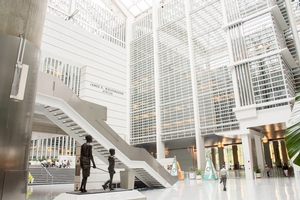Alumni
How to Get Your Dream Job

It’s not everyday that students in the formative years of their career development have a chance to speak with professionals working at their dream careers. For Washington Semester Program students, however, such opportunities are ample.
In fact, this month our students got up close and personal with three World Bank professionals -- among them a Washington Semester Program alumnus -- in what was a rich and intimate discussion on making waves in the international development sector. Together, WSP alumnus Dr. Achim Schmillen, Rural Development & Labor Specialist Dr. Izabela Leao, and Health Specialist Dr. Federica Secci talked about the impactful work they do around the world, as well as the unique opportunities that are available for young professionals who aspire to work in their field.
“At the World Bank, it’s important to have an area of expertise - to have a deep dive into a specific topic,” said Schmillen, who works under the sector of Social Protection & Labor. During his Washington Semester in 2006, Schmillen had a Foreign Policy concentration. “It’s also about not being too narrow [and] having a broader set of experiences, especially real-life experience.”
Schmillen, Leao, and Secci strongly advocated for gaining hands-on experience to achieve a fine balance between general know-how and finite expertise. In the case of international development work, all three emphasized a need to understand the nuances of human interaction:
“I think it is really important that [young professionals] have the soft skills - the human skills,” explains Secci. “Experiencing the world first-hand rather than in a book or in a library... adds a lot, especially if you apply for one of the programs [offered at the World Bank].”
Before Dr. Achim Schmillen came to the World Bank as an economist, however, he was an economics major from the University of Regensburg in Germany who knew that a semester in Washington D.C. would grant him unique political education that were applicable to his passions. In fact, Schmillen notes that one of the main takeaways of his experience was how it offered him a different perspective on global economics, noting that “One of the things from just the content and substance of the Washington Semester program was really [learning how to] think about the political dimension of all things.”
He goes on to say, “When I’m here in DC, I would be writing papers or writing policy notes for governments on different topics. When I’m traveling in country, which I do four or five times per year, it’s more about giving presentations, taking in discussions, and really trying to provide advice on how to structure their social protection and labor systems in the best way.”
Schmillen notes that much of why he enjoyed his time with WSP is due to the close relationship his professor - Dr. Christian Maisch - maintained with all his students. Committed to the growth and success of all his students, Maisch is still a professor with WSP teaching foreign policy to students.
In the complicated game of career exploration and academic achievement, it’s easy for students and young professionals alike to lose track of the most important habits to maintain for success. One takeaway among many given during this special visit involved the need for young people to latch onto their interests early on and build up their faculties of expertise as much as possible:
“A good education is a plus, but none of us [at the World Bank] were hired because of the PhD. It’s really about what you do [with your time],” encourages Schmillen.
He builds from this, saying “[It’s also about] the topics you know, the practical experience, and your ability to tell the story of what you’ve done and what you’ve achieved. Then, you’ll be on the right track.”
